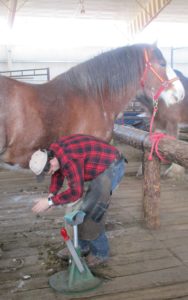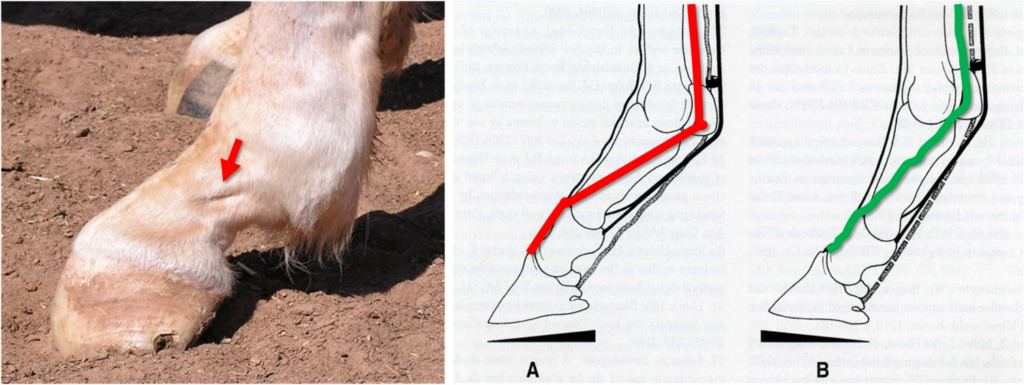Strong Back, Stronger Mind

Farrier work is physically demanding, but it is also intellectually stimulating. A farrier must know the correct amount to trim and understand how a trim or shoes will affect an individual horse.
Do farriers use their brains? Some people incorrectly assume that farriers don’t have “book smarts.” There is a common misconception that in order to be a farrier, one must have a “strong back and a weak mind.” This, unfortunately, has been perpetuated by those delicate souls that are afraid of hard work. They have concluded that the only reason someone would work so hard is because he or she isn’t smart enough to find a different, easier, “real” profession (these are usually the same people who complain about how much the farrier charges!).
Nothing could be further from the truth. Yes, farrier work is physically demanding, but it is also intellectually stimulating. The best professional farriers study the science of the horse. They never cease learning. Farrier testing and certifications provide some of the most challenging exams. A candidate must pass written and oral exams as well as demonstrate it’s practical application on a live horse. Applying knowledge and skill to help horses feel better and improve performance is what makes the job so rewarding
Customers value competent farriers not only for what they can do, but also for the knowledge they have. Farriers work with their hands and back, as well as with their minds. The more a farrier studies and learns the more valuable he or she will be to the horse and horse owner. Expanding one’s knowledge and skill base also opens doors to working with other skilled equine professionals like veterinarians. Good veterinarians will not work with a farrier that doesn’t know what he or she is doing.
Professional Farriers learn the structures of the foot. They understand through study and experience what can go wrong and how they can help. They understand how a condition or ailment affects a horse and how a treatment can improve that condition or ailment. They also must learn what doesn’t work (regardless of a promoter’s endorsement). These judgments can be made by the person who takes the time to study anatomy, physiology, conformation and balance.
For example, a horse with a suspensory sprain will give the appearance of a dropped fetlock. It looks as though the horse should be brought back into alignment by raising the angle, but this is wrong. A knowledgeable farrier will recommend lowering the angle of the hoof because he or she understands the suspensory ligament attaches to the extensor process on the dorsal surface of the distal phalanx and therefore will be alleviated by raising the toe and lowering the heel. If the angle was raised, it would cause more tension on the suspensory ligament and more pain for the horse. In one case, a horse’s extensor process actually fractured because the foot was elevated. This happened simply because the farrier did not know the anatomy. The farrier said, “raising the heel just looked right.” The horse eventually had to be euthanized. A horse’s well-being and performance ability can be dependent on a farrier’s (and a veterinarian’s) depth of knowledge. Sometimes, the horse’s life may be at stake.

Left: A suspensory sprain causes the fetlock to drop. At first inspection, it appears the angle should be raised (elevate the heel), but this is wrong. Note the extensor branch of the suspensory ligament (red arrow); Right: Illustration of the effect a raised angle (A) or lowered angle (B) has on internal structures. When the hoof angle is elevated (A), the suspensory ligament (red) is under greater load. This is a bad idea if the suspensory ligament is sprained. When the hoof angle is decreased (B) the pressure on the suspensory ligament (green) is reduced. Drawing Credit: J. M. Denoix. Dubai International Equine Symposium. Proceedings, 2000.
The Farrier Focus Podcast has been full of great examples of farriers that show just how academic farriery can be. Interviews with Dr. Doug Butler, Allie Hayes, Dr. Simon Curtis, and Walter Varcoe are just a few of the recent examples of individuals who are contributing to accessibility of resources for farriers to increase their understanding of horses. These interviews offer fascinating insights into the academic side of farriery.
Competent farriers know how to study, learn and apply new concepts and skills. Studying textbooks, scientific journals and specimens (not just opinions on the internet) and applying the knowledge is what makes a farrier professional. There is a lot to learn. That shouldn’t be discouraging to a farrier who wants to continually improve; it should be exciting! The book learning is enjoyable because of the practical application to the craft. It can also be enjoyable because it can make the farrier more money. The old adage, “the more you learn, the more you earn”, is applicable. Knowledgeable, skilled farriers can potentially earn a great living. They are able to work with other skilled professionals to do a job that they enjoy. A competent, professional farrier, dedicated to the craft, is thrilled to see the comfort and life of a horse improve. To make this happen, they are constantly learning.
Related Posts
-
Sir Isaac Newton, one of the world’s greatest scientists w...Jul 12, 2011 / 0 comments
-
The horse’s foot is a bio-mechanical marvel with many part...Feb 21, 2019 / 0 comments
-
When you meet true professional farriers, they do what they ...Jan 09, 2020 / 0 comments
Blog Categories
- Anatomy
- Best Business Practices
- Conformation
- Current Events
- Customer Service
- Draft Horse Shoeing
- Equine Soundness
- Essential Anatomy Kit
- Farrier Careers
- Farrier training
- Foal soundness
- Horse Care
- Horse Foot Care
- Horse Owner Tips
- Horsemanship
- Horseshoeing
- Horseshoeing History
- Iron and Forge Work
- Student Spotlight
- Uncategorized
- Veterinary Care
Blog Archives
Contact Us
Butler Professional Horseshoeing School
495 Table Road
Crawford, NE 69339
(800) 728-3826
jacob@dougbutler.com
Subscribe to Our Blog
Get Our Free e-Book!
If you think you want to become a farrier (or know someone who does), this book can help you make that decision. Horse owners will learn the importance of choosing a qualified farrier and how to select the “right” one.
[ Get the e-Book Now! ]
- Follow:
